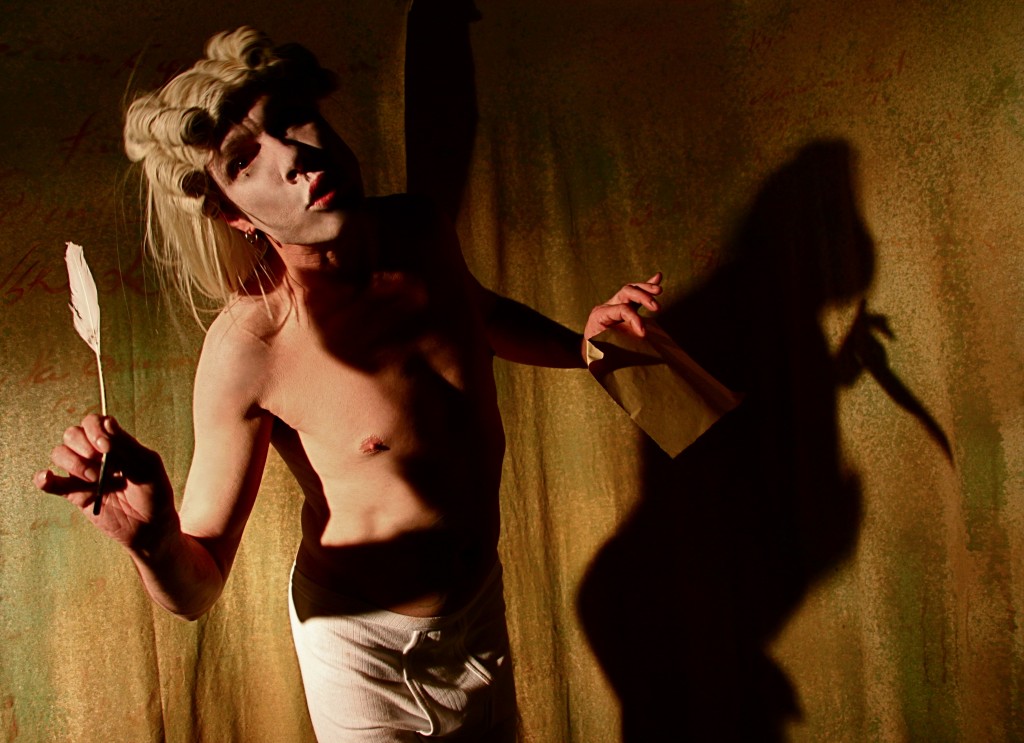Reviewer: Steven Barfield
This new production of Quills, an Obie award-winning American play from 1995 that was later adapted into a successful film (2000), shows Second Skin Theatre on fine form: the production will not disappoint anyone who believes theatre should be vital, challenging and visceral. The theatre company’s new permanent home is in the basement of the White Rabbit in Stoke Newington and this is the strangely enough, the London premiere of this critically well regarded play as well as the first play in the company’s new home. Andy McQuade, the director, is a Fringe Report award-winning fringe director, as well as artistic director of Second Skin Theatre.
It is a performance with much fine (and in certain cases brave) acting, as well as astute direction; the small basement space of the cocktail bar ( you can buy a special Marquis de Sade cocktail upstairs, if you are feeling brave), is so intimate that the audience will have no choice but to listen to the debate in what is above all an uncompromising, rigorous play of idea embedded in some remarkable characters that is fiercely relevant to today. It is a play and production that is as outrageous and thought-provoking as much as it often riotously funny and sometimes tragic. It should be noted that the play isn’t intended to be historically accurate and the horrible death of the Marquis on stage was not what happened to him in real life.
France 1806 and the Marquis De Sade has been confined to the asylum of Charenton, run by the Enlightenment figure of the Abbé du Coulmier who believes in a therapeutic rather than punitive regime. But against the hospital’s rules, de Sade is secretly smuggling out his stories created during his writing therapy to a scandalised, but greedy public, via a seamstress and laundress Madeleine “Maddy” . There is a battle of wills between the Abbé and more traditional Dr. Royer-Collard, a medical practitioner, who is an upwardly mobile bourgeois, building his own chateau, complete with a young and bored wife. Dr. Royer-Collard has little time or inclination for humane treatment of inmates, especially of the Marquis he judges an evil rebel against the social order he represents. There is a second battle of wills between the establishment who wish to stop him and the Marquis, who is desperately determined to write, even though it will lead to his physical destruction: in ink, in wine, even in blood. The situation will have an unhappy ending for almost everyone and without giving the jagged plot twists away, by the end we’ll see some abrupt changes of character as hidden aspects are revealed as well as the astonishing ebb and then flow of the enterprising Marquis’ fortunes as fiction writer.
Peter Glover makes for a fantastically exuberant de Sade; at turns lascivious, provocative and vulnerable, in what is something of a tour de force of acting that goes from high camp to pathos. He spends part of the play completely naked and in this case he is brave. Chris Brown as the Abbé is a sensitive and humane soul, gently spiritual, but Brown gives full weight to his transformation into a kind of monster due to the taunting gambits and refusal to abjure from writing of the Marquis. The relationship between De Sade and the Abbé is almost a love affair of sorts, a ritual where De Sade tempts him and produces some powerful sorties. Stephen Connery-Brown’s Royer-Collard is a splendid example of humbug, selfishness, hypocrisy and social climbing while Lauren Kellegher’s Renee Pelagie, the wife of the Marquis is an equally funny lampoon of a woman who sees her marriage to her notorious husband as something to be traded on the stock exchange of social gossip. Nika Khitrova’s Madeleine manages to show a young and impoverished woman caught between profanity and virtue, recognising that the Marquis is much like the Gothic villains in the fictions she loves.
The production is balanced between Grand-Guignol style horror and the humanity and vulnerability of the characters and is thus a beguiling one, although its important to say that what makes this play so provocative is the way our sympathies change as the play progresses: we become closer to the unfortunate, if in many ways utterly repellent Marquis due to the transformation of the supposedly good and morally virtuous characters. But it is also a debate that is far from concluded about censorship and its limits and the way mainstream society demonises those it sees as potentially dangerous, even if such danger lies only in their imagination; should we censor or do we run the risk of merely refusing the deeply buried secrets in societies own unconscious?
Runs until 11th November





